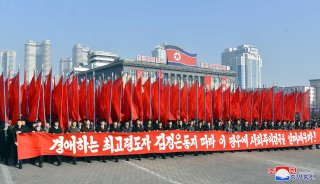Will Anything Really Change If Kim Jong-Un Dies?
The regime might be less stable, but the Kim family isn't going away.
Editor's Note: This is part of a symposium asking what happens if Kim Jong-un died. To read the other parts of the series click here.
As crazy as it sounds, Kim Jong-un brings stability and relative predictability to North Korea. Would his sudden death ensue in a smooth transition and continuation of the status quo, or a power struggle between elites that may destroy the regime altogether?
Considering the Kim family’s importance to the nation’s identity, the first scenario seems far more likely. After all, the legitimacy of authority comes from being a member of the family.
In that case, the first question that comes to mind is, who will succeed Kim Jong-un? The increasing presence of Kim Yo-Jong—Kim Jong-un’s sister—in the party’s leadership suggests she could head the state eventually. However, questions of a successor are not as important as what happens during the transition period.
Kim Jong-un was named Kim Jong-il’s successor in 2009 and had two years to prepare before succeeding his father upon his death in 2011. At the time, experts had pointed out that unhappy members of the military might contest the succession of an inexperienced Kim Jong-un. That seems to be the case today, with some experts questioning whether the political and military elites would back another inexperienced successor.
We can assume that the political and military elite will back the new ruler. The very public purging of top officials between 2011 and 2017 could be replicated by Kim Jong-un’s successor to secure his/her authority. If this is the case, the elite would rather stay in the sphere of power than risk losing that position.
In actuality, the presence of foreign countries poses a far greater challenge to the stability of North Korea. Past actions prove that North Korea will attempt to downplay the significance of the Supreme Leader’s death with increased military actions. Currently, the world is preoccupied with coronavirus, but that could change if Kim Jong-un dies. In particular, the United States will need to practice restraint, unlike in the past, when President Trump made explicit threats that military solutions were “locked and loaded.”
China may also be prompted to move into North Korea if the situation becomes dire. While China remains on better terms with North Korea than others, they have had issues dealing with Kim Jong-un. Trade may have increased, but hostile acts, such as the launch of a Hwasong-12 missile during the inaugural Belt and Road Forum, question the ability of Beijing to rein in Pyongyang. China may try to place a pro-China leader or elites close to the leader in an attempt to further influence Pyongyang. Discussion between America and China will be paramount to ensure that no major conflict breaks out during the transition.
As a result of the overwhelming victory for President Moon Jae-in’s party in the National Assembly elections two weeks ago, Seoul is likely to resume their proactive approach towards Pyongyang. This would allow North Korea to temporarily ramp up military actions, as Moon is unlikely to escalate tensions like his conservative counterparts. South Korea will want a smooth transition in order to restart reunification talks. To achieve this, coordination with the United States will be desirable to ensure no mixed signals are sent.
If we have learned anything about North Korea throughout history, it is the fact that perceived weakness only fuels resistance. Any country’s attempt to exploit Pyongyang’s weakness will be met by a stronger sense of self-reliance (juche) by North Korea.
It is optimistic to believe that Kim Jong-un’s death will be the death of North Korea. In fact, it would be an error in signaling from other countries that may set off a chain reaction, leading to a full-blown conflict over North Korea.
Regardless of Kim’s health, this uncertainty surrounding North Korea is something to consider for years to come.
Rintaro Nishimura is a Korean Studies Spring 2020 Research Assistant at the Center for the National Interest.
Image: Reuters

